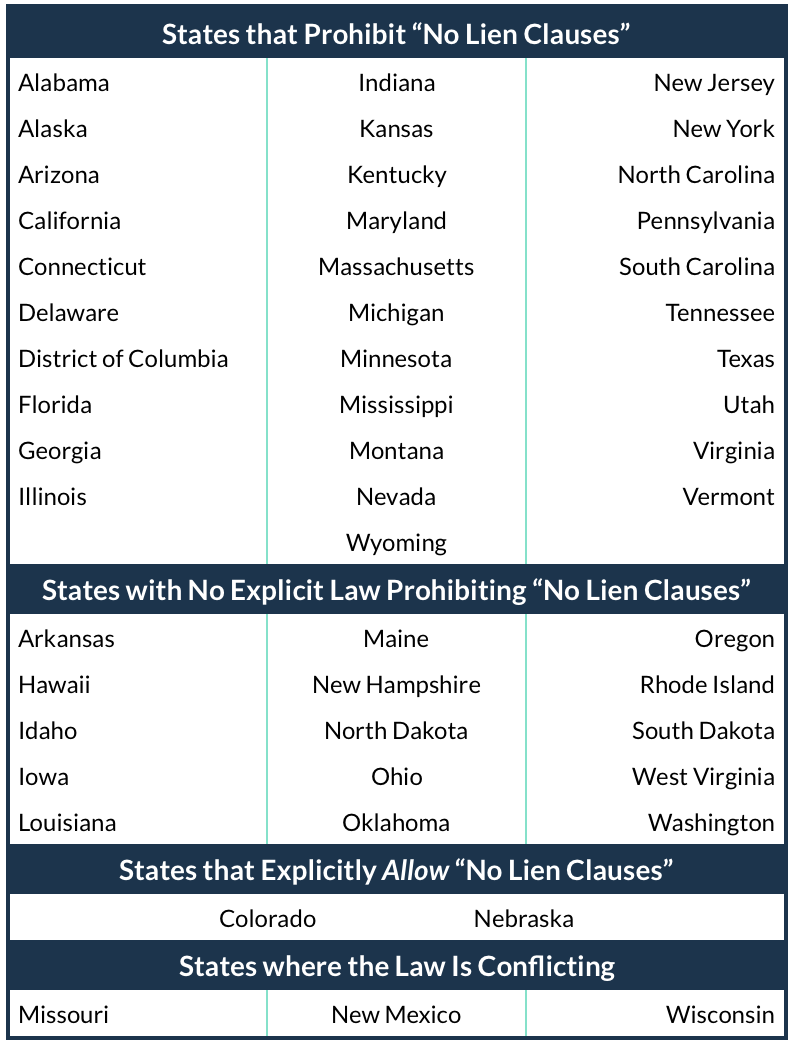
When a construction contract contains language that requires a subcontractor or materials supplier to waive their lien rights when the contract is signed, and before the actual work on the project has even started, this is called a “No Lien Clause.”
How Does a “No Lien Clause” in a Construction Contract Work?
To illustrate how it works, imagine this scenario:
A subcontractor is about to sign a contract with a prime contractor to begin work on a new construction project. Before he signs, the sub reads through the contract language until he gets to a strangely worded clause a few pages in which seems to say that the subcontractor has to agree that he will not file a lien on the project no matter what, and that he has to agree to this provision before work on the project even starts.
Or in other words, the contract stipulates that the subcontractor must perform the work described in the contract without the right to file a potential claim if unpaid.
Which States Allow No Lien Clauses?
While the majority of states (up now to 31 states, a group most recently joined by the Commonwealth of Virginia), expressly forbid this practice, there are 2 states that expressly allow No Lien Clauses: Colorado and Nebraska.
In 3 more states – New Mexico, Missouri and Wisconsin – the law is conflicting. And 15 states have no explicit law either banning or sanctioning the practice. (Note: Though it’s generally accepted in construction law circles that these 15 states would follow the majority of the fellow states and forbid No Lien Clauses, they nevertheless remain silent on the issue, and there is some risk associated with this ambiguity).
- States that prohibit No Lien Clauses: Alabama, Alaska, Arizona, California, Connecticut, Delaware, District of Columbia, Florida, Georgia, Illinois, Indiana, Kansas, Kentucky, Maryland, Massachusetts, Michigan, Minnesota, Mississippi, Montana, Nevada, Wyoming, New Jersey, New York, North Carolina, Pennsylvania, South Carolina, Tennessee, Texas, Utah, Virginia (except for GCs), Vermont
- States that allow No Lien Clauses: Colorado and Nebraska
- States with conflicting laws about No Lien Clauses: Missouri, New Mexico, Wisconsin
- States with no explicit law prohibiting No Lien Clauses: Arkansas, Hawaii, Idaho, Iowa, Louisiana, Maine, New Hampshire, North Dakota, Ohio, Oklahoma, Oregon, Rhode Island, South Dakota, West Virginia, Washington
Who Would Want a No Lien Clause, and Why?
A No Lien Clause is basically a strong-arm tactic used by larger and more powerful industry players higher up on the project food chain – prime contractors, lenders and sureties – to try to coerce smaller players further down the food chain – like subs and materials suppliers – to give up their rights to fair and prompt payment.
The end result is that the larger players can delay their payments (or worse!) to the project’s subs and suppliers, and there’s nothing that the smaller down-stream players can do about it. Reasons for wanting to delay payment can vary and include concerns that are practical (i.e., using the withheld payment as an easily accessible financing mechanism), to the more nefarious (using the withheld payment as leverage against the smaller sub or supplier). Either way, if a No Lien Clause is in place, the down-the-chain player is stuck up the proverbial creek without a paddle.
But it needs to be said that the ability to lien really isn’t the issue; the real issue is that a No Lien Clause forces the downstream project participants to assume the risk of slow- or non-payment from those further up the chain. And since the downstream players are typically smaller with less resources and access to cash, this creates a situation that is not only unfair, but can threaten a company’s very existence. And that’s where levelset comes in. levelset isn’t here just to file liens. Our main goal is to help you get paid by enabling you to manage your lien rights.
Other Unfair Contract Provisions Targeted at Subs
When looking at the country as a whole, the scales of justice tip in favor of subcontractors and suppliers regarding No Lien Clauses. Simply put, more jurisdictions in the US disallow the practice than allow it. But there are other unfair contract provisions that are used by those at the top of the payment chain – lenders, owners, and prime contractors – to shift the risk on a project down the chain onto the subs and suppliers. It is important to always read contracts in full and to be aware of these potentially dangerous clauses including:
- Pay-If-Paid or Pay-When-Paid Clauses
- Unfair Lien Waivers
- “Over the Top” Indemnification Requirements
- “Over the Top” Use of Retainage
- “Over the Top” Payment Bond Requirements
- No-Damages-for-Delay Clauses
- Mechanics Lien Subordination
Further reading:
Conclusion
Thankfully, the vast majority of states either forbid the use of No Lien Clauses outright, or will not enforce them if an owner or prime contractor attempts to insert one into a contract. But construction parties must remain vigilant when examining their construction contracts, because even if No Lien Clauses aren’t enforceable, there are several other methods available to top-of-the-chain parties that may end up having the same effect.



